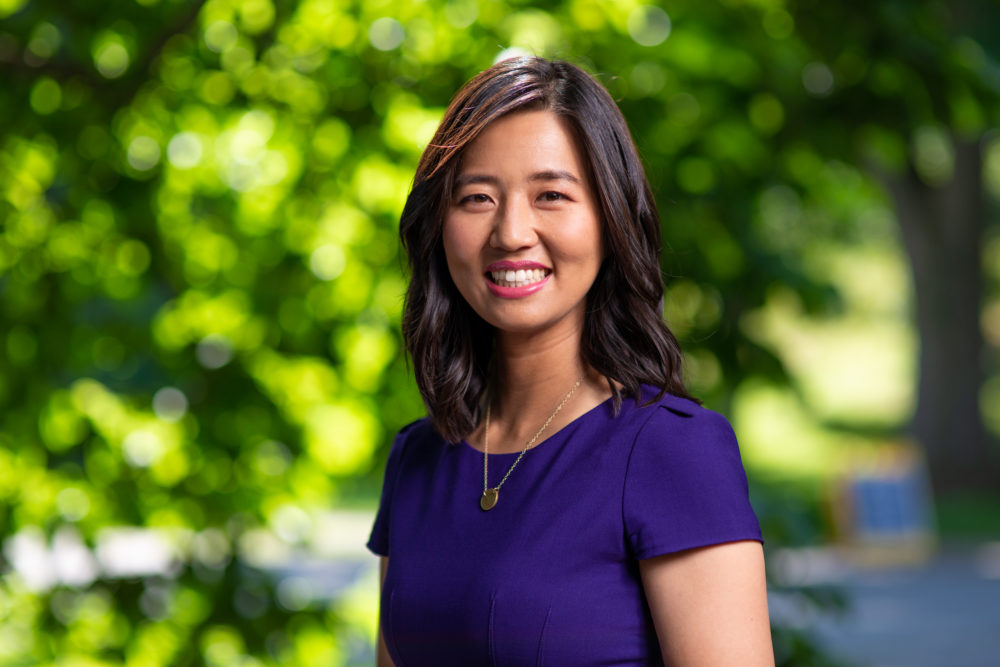Michelle Wu was elected Mayor of Boston on November 2, 2021 after defeating opponent and fellow Boston City Council member Annissa Essaibi-George. Widely known as a protegee of Elizabeth Warren, Wu was elected as the first Asian American woman to serve on the Boston City Council in 2013 and served as Council President from 2016 to 2018. After breaking a 199-year-old streak of white, male elected city leaders, she plans to lead Boston in a progressive, new direction. She ran with the promise of implementing the Boston Green New Deal plan, but how do her new policies align with her old actions?
Michelle Wu is considered progressive and the mayoral race in November was seen by many as a Democratic battle between the old guard and the new progressive wing. Essaibi-George cast herself as a more moderate candidate with family roots in the city. She championed issues such as reforming the Boston police force with the support and partnership of the police department, whereas Wu stated that she would overhaul Boston’s four primary police union contracts. Despite the moderate lean that Essaibi-George took in hopes of appealing to blue-collar Bostonians, Wu had a clear lead in initial vote counts and Essaibi-George conceded to Wu.
In her previous role as council president, Wu has voted to authorize various laws in support of climate change policy. For example, on October 4, 2017, the City Council voted unanimously to pass an order authorizing the City of Boston to adopt Community Choice Energy. The bill placed residents and small businesses onto an electricity plan that relies on more renewable energy than the amount that utilities must buy to meet state mandates. Wu stated, “this is the single largest action that the City Council could take to immediately and dramatically increase our renewable energy sourcing in Boston.” Clearly, Wu has worked to improve and support renewable energy initiatives in Boston previously as a city council member, but passing city-wide legislation as mayor is a new challenge for Wu.
Though it may be a complicated road to follow, Wu has promised that climate change will be a cornerstone of her administration in Boston. Wu has said that one of her first actions as mayor would be to abolish the Boston Planning and Development Agency (BPDA), replace it with a municipal planning department that would overhaul Boston’s zoning code, and launch a city-wide master planning effort more focused on affordability, traffic mitigation, and resilience to climate change. This would require approval from the state, as the agency was originally created by both the Boston City Council and the Massachusetts Legislature over a half century ago. Wu has said that she will take immediate action within the city by shifting the BPDA’s employees onto the city payroll and reassigning them to different departments, one being a newly created “planning department.” Obviously none of these changes can occur overnight, but having a plan with actionable goals is admirable.
Another item Wu is already working on as the newly elected mayor is her Boston Green New Deal. This policy approach differs from previous climate change efforts because it invests in climate change action by combating social inequities. Through investing in reversing climate change injustices, it becomes an infrastructural investment both physically and socially, as opposed to an expensive ticket item without any major benefits to taxpayers. Wu’s plan for a Green New Deal in Boston consists of a series of interconnected policies and actions, including expanding cooperative and community-owned housing and land trusts, growing the urban tree canopy, and divesting public pension funds from extractive industries as well as private prisons and gun manufacturers. It also calls for making city data public, expanding equitable access to affordable, nutritious, and culturally-appropriate food, harnessing coastal and ocean resources for clean energy and sustainable food, as well as building partnerships and expert coalitions to inform policy implementation.
Wu’s successful campaign suggests a new strategy for climate change policy that could work on a national scale: melding climate justice with economic and racial justice, as opposed to attacking them as separate problems. By linking the issues together, it becomes easier to justify large-scale change. National climate change policy is still tenuous and in the nascent stages of development, but Boston is clearly paving the way for other cities to follow.
Sources
Alaina Boyle and Jennie C. Stephens, opinion contributors. (2021, November 12). Michelle Wu’s victory heralds a new age of climate politics. TheHill. https://thehill.com/opinion/energy-environment/581343-michelle-wus-victory-heralds-a-new-age-of-climate-politics?rl=1.
McDonald, D. (2021, October 30). On policing, Boston mayoral candidates Michelle Wu and Annissa Essaibi George are Miles Apart – The Boston Globe. BostonGlobe.com. https://www.bostonglobe.com/2021/10/29/metro/policing-boston-mayoral-candidates-michelle-wu-annissa-essaibi-george-are-miles-apart/.
Michelle Wu. Boston.gov. (2016, March 7). https://www.boston.gov/departments/city-council/michelle-wu.
NBC10 Boston. (2021, November 3). New mayor Michelle Wu’s top priorities for Boston. NBC Boston. https://www.nbcboston.com/on-air/as-seen-on/new-mayor-michelle-wus-top-priorities-for-boston/2550969/.
Romo, V. (2021, November 3). Michelle Wu is Boston’s first woman and first person of color elected mayor. NPR. https://www.npr.org/2021/11/02/1051720391/boston-mayor-michelle-wu-elected.
Wikimedia Foundation. (2021, November 21). Michelle Wu. Wikipedia. https://en.wikipedia.org/wiki/Michelle_Wu.
Featured image from https://www.wbur.org/events/724188/wbur-town-hall-meet-boston-mayoral-candidate-michelle-wu

